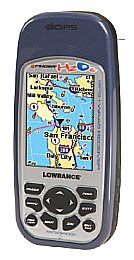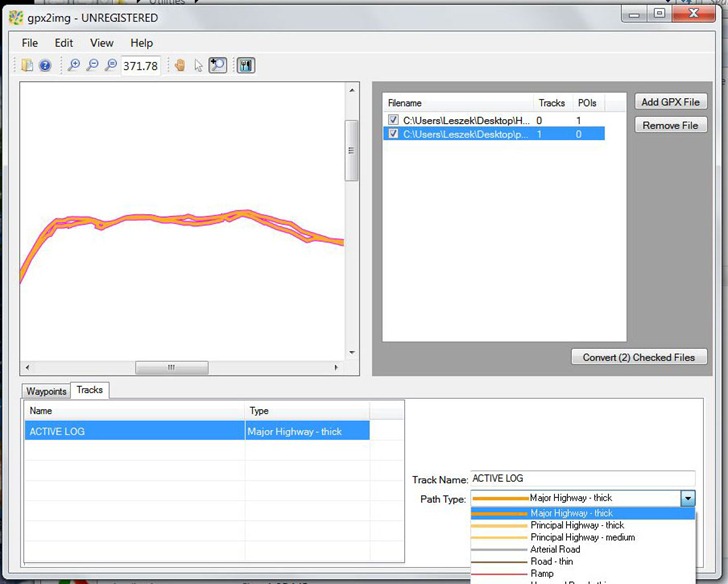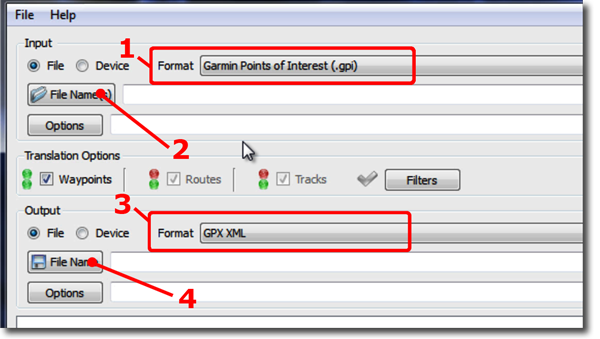
This means that GPS::Babel will confidently guess that the format for a file called something.wpt is xmap even if the file contains compegps data. wpt files but gpsbabel (currently) reports that the only format explicitly associated with the. That raises the spectre of a program that works now breaking in the future.Īlso some formats support a particular extension without explicitly saying so - for example the compegps format supports. Because new formats are being added to gpsbabel all the time it's possible that a format that can be guessed today will become ambiguous tomorrow. While this can be convenient there is an important caveat: if more than one format is associated with a particular extension GPS::Babel will fail rather than risking making the wrong guess. This makes it possible to, for example, create tools that bulk convert a batch of files choosing the correct format for each one. GPS::Babel queries the capabilities of gpsbabel and can use this information to automatically choose input and output formats based on the extensions of filenames. This information is available as a perl data structure which may be used to construct a dynamic user interface that reflects the options available from the gpsbabel binary. GPSBabel is able to describe its built in filters and formats and enumerate the options they accept. For more complex cases a passthrough method ( direct) passes its arguments directly to gpsbabel with minimal preprocessing. It does however provide for simple access to the most common operations. This module doesn't attempt to provide an API wrapper around all these options. GPSBabel supports many options including arbitrary chains of filters, merging data from multiple files and many format specific parameters. This module provides a (thin) wrapper around the gpsbabel binary making it easier to use in a perlish way.
#Gpsbabel gpx to usr serial
In addition to file conversion it supports upload and download to a number of serial and USB devices. GPS data have imposed upon us, it returns to us the ability toįreely move our own waypoint data between the programs and hardwareĪs I write this gpsbabel supports 96 various GPS related data formats. Tower of Babel that the authors of various programs for manipulating GPS unit such as those from Garmin and Magellan. f in.anr -f in2.anr -o an1,type=road -F out.an1)) DESCRIPTIONįrom : GPSBabel converts waypoints, tracks, and routes from one format toĪnother, whether that format is a common mapping format likeĭelorme, Streets and Trips, or even a serial upload or download to a $babel->direct(qw(gpsbabel -i saroute,split $babel->convert('points.wpt', 'points.gpx') # Convert a file automatically choosing input and output My $data = $babel->read('route.ozi', 'ozi') # Read an OZIExplorer file into a data structure This document describes GPS::Babel version 0.11 SYNOPSIS use GPS::Babel

GPS::Babel - Perl interface to gpsbabel VERSION Ĭonversion will process traces and waypoints. We have voluntarily limited file formats to those containing traces. The conversion utility used here is "GPS Babel". Google Earth allows you to view in 3D your trail trace on a satellite picture of the area, to zoom in on the trace and to change the viewing position. If you have installed Google Earth on your computer, the file format used by Google Earth is 'Keyhole Markup Language'.

grm.įiles of formats 'GPX XML' and 'Garmin PCX5' are 'text' files, which means that you can open them with a word processor(for example Notepad on Windows). įor traces from Cartoexploreur, you can use the 'Garmin PCX5' format, and rename your files with extension. On this site we only use the 'GPX XML' format (to enter an trail trace or to download the GPS trace file).

This interface allows you to convert your GPS files from one format to another. Depending on the GPS model you are using, the file format may differ.


 0 kommentar(er)
0 kommentar(er)
